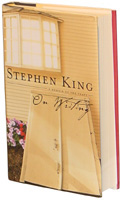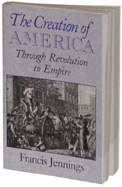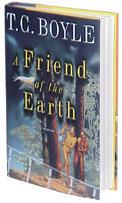|
The twentieth-century activism of eco-terrorist Ty Tierwater is set against the I-told-you-so apocalypse of the early twenty-first in T. C. Boyle's masterful new novel. Tierwater is seventy-five in 2025, but owing to the miracles of modern medicine ("thrust upon us"), he's active and virile, his voice young and familiar. He manages a menagerie of extinct species for a Michael Jackson-eske character named Maclovio Pulchris. When Tierwater's ex-wife, Andrea, a director of the environmental non-profit group Earth Forever! re-enters his life, the memories of his earlier incarnation and his tree-sitting daughter's death consume him. The world is a forbidding place after the collapse of the biosphere, deforested with gobs of rain followed in rapid succession by high winds and searing heat, though life goes on in a strangely reorganized fashion (New York isn't even among the top ten largest cities in the world, and sake is the beverage of choice on the west coast.) But this is more than a prediction as to what the world might be like in twenty-five years. It's more than an even-handed depiction of the good, the bad and the silly of the environmental movement, past, present and future. At it's core, A Friend of the Earth is an eloquent, beautifully written human drama, the story of a man's love for his wife, love for his daughter and acceptance of self. Regardless of one's views on environmental issues, A Friend of the Earth is well worth reading.-Todd Wright
 ON WRITING: A MEMOIR ON WRITING: A MEMOIR Stephen King Scribner
When people want to learn how to write, you ask the pros: Updike, Vonnegut, Stryon, etc. No one ever asks a 'popular' author, let alone horrormeister Stephen King, But King had something to say. On Writing is really three books: a short biography of King, which he presents as his development as a writer, instruction and advice on writing and being a writer, and ending with a section titled "On Living," written about his car accident, and how writing became a fundamental therapy to him. The dual-purpose of the book is a little jarring, but works on the whole. Frankly, both biographical sections, full of King's casual tone, flair for character and his simple honesty (such as still being embarrassed over having written Maximum Overdrive) makes for a great read; it's the tale of a mega-popular author, how he became one, how he created his own style to crank out his huge tomes of horror that half the US picks up. As a small peep into the fundaments of popular culture, On Writing is fascinating. And of course it's interesting when he's hit by the van as well, especially with King's tone. The actual section on writing is somewhat less effective; King is not trying to teach how to be a great writer, nor even how to write well, admittedly. He simply offers his own ideas on the importance of mechanics, editing, and getting represented. In this, On Writing is certainly useful for helping shape those with talent already, but for the rest, it boils down to "Read and write a lot." Which Vonnegut said years ago. -RB
 THE CREATION OF AMERICA: THROUGH REVOLUTION TO EMPIRE THE CREATION OF AMERICA: THROUGH REVOLUTION TO EMPIREFrancis Jennings Cambridge University Press
If you look at life with a cynical point of view - and let's be honest, if you read this publication regularly, that is probably the case - you should really like Francis Jennings' book. Jennings argues that the founding fathers were not as virtuous as we've been led to believe. Actually they were more like the British than they cared to admit. The founding fathers simply wanted to throw off the British Empire so they could start their own. We know that the Americans did not care about liberty, because they exploited African Americans and Native Americans. George Washington and Ben Franklin were motivated by greed and John Adams was a power-hungry and cowardly man. Jennings has some thought provoking points, but his position is too extreme. He mentions several examples of colonists who did not try to exploit the Indians, yet he still maintains his sweeping generalizations about how the founders were motivated by the possibility of empire building. One can certainly make the point that of all the individuals involved in the Revolution, there were several motivating factors. Not all those factors were good, but not all of them were evil either. Jennings does such a good job of presenting the evidence that he undermines his own position. He rightly pointed out that Native Americans and African Americans were mistreated, so this country did not live up to its high-minded ideals. But many of the founding fathers were at least ambivalent about the wrongs. One can legitimately look at the glass as being half-full. This nation was founded on several principles that were at least a step in the right direction. The leaders may not have acted like all men were created equal, but the idea of equality was introduced to the political consciousness, and the foundation was set for greater things to come. -Tim Holder
|
||
|
|
 A FRIEND OF THE EARTH
A FRIEND OF THE EARTH